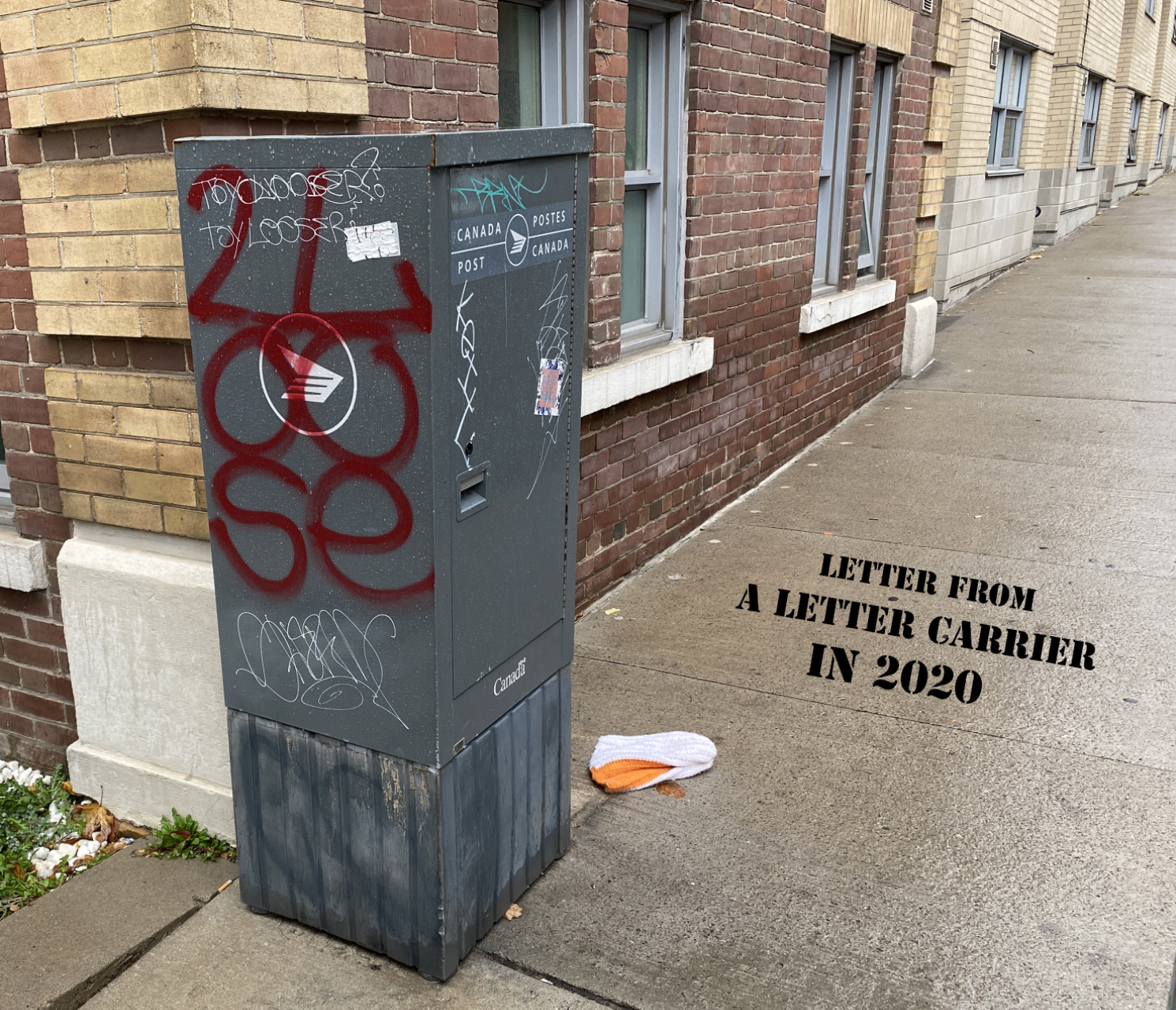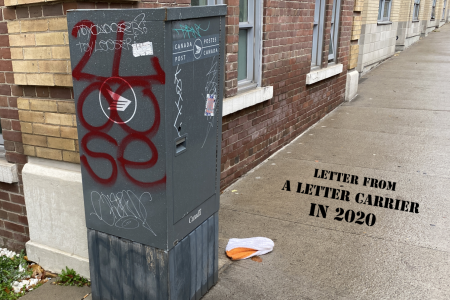
LETTER FROM A LETTER CARRIER IN 2020
It’s been a tough go for postal workers this year. As a Canada Post letter carrier, I often find myself anxious, worrying that I am mindlessly facilitating mass consumption and environmental waste. Gone are the days of actual written lettermail, which now represents less than 5% of the mail that I deliver each day (although I love to see it). The rest are parcels of online shopping orders and stacks of junk mail. Capital doesn’t stop moving, even in a crisis, and this pandemic only intensifies my daily experience of waste, spending and social isolation. And 2020 gave us no breaks. Demand for mail delivery services have skyrocketed, and public scrutiny along with it. Of course, I know that Canada Post’s much-decried delays have everything to do with new distancing measures, border hold-ups, and a workforce spread thin by childcare, work-related injuries and mandated quarantines. But people gripe, and we keep trying to keep up. Then of course, USPS’ future appears at risk during the American election, making it hard not to question what the future of Canada Post will look like. Here are the top issues on my mind during this postal paradigm shift:
This has never been harder
I’ve been a full-time carrier for almost two years, and trust me, pounding through postal routes is hard on your body! And breaks are scarcer than ever. See, most years, mail is slower in the summer season, offering carriers a built-in time to rest and recover ahead of the busy Fall and Winter rush. Of course, 2020 offered us no such downtime — with so many people online shopping, the busy season is now year-round.
How secure is mail?
I asked a fellow postal worker about privacy and security in the mail processing plant where they work. I quickly gathered that sending and receiving via Canada Post is secure AF. No one looks at the mail. Seriously, no one — opening mail is one of the few things that can actually get you fired. Anyone handling mail undergoes a security screening and is trained to prevent privacy breaches, and there are cameras around the plant, so it wouldn’t be easy to pull off. Cellphones aren’t allowed. Snail mail is also pretty hard to intercept, given the many stops it makes: after you put your mail in the red box on the corner, staff like me pick it up, throw it on our truck, take it to the depot, it goes onto a truck, then to the plant to be sorted, then on a truck or a plane to its destination, then to another plant, then to another carrier’s case, into their hands and, hopefully, into your pal’s mailbox! Woof. Many steps indeed. Legally, police are technically able to look through mail that Canada Post is processing, but this requires a search warrant and would require searching for and intercepting the item somewhere along that chain — rarely does this happen.
Where mail matters most
The Post Office has its uses for activists of all strides, though. Perhaps more than anything else, mail is crucial to support prisoners, who have little or no access to internet and phones. Mail helps sustain emotional and practical connection to the outside world (and of course, reading material!) all incoming and outgoing mail is subject to search and so much is banned — anything written in code, drugs, electronics, weapons” – but a simple letter can go a long way. The wellness of incarcerated folks is huge — it is an integral part of justice and should be prioritized. The wellness those incarcerated can be viewed as a form of resistance in itself. Even though family units may be broken in a physical sense, the movement of mail in and out of the prison or jail helps to sustain an emotional connection. As a letter carrier during COVID-19, I’m proud to help sustain that channel for incarcerated folks, but also angry at the brutal reality that makes it so necessary. Things are only going to get weirder for the mail, I’m sure of it. Do me a favor and send something awesome to someone super far away, yeah? I promise not to open it.
THREE WAYS TO DO POSTAL ACTIVISM
1. Become a prisoner’s penpal.
For thousands of incarcerated people, mail is a lifeline to the outside world. There are various grassroots prisoner penpal projects in Canada and the world over. Check out:
•The Prisoner Correspondence Project
• The Barton Jail Solidarity Project
•South Chicago ABC Zine Distro
•Your local Anarchist Black Cross

2. Write letters to policy makers.
Legislators and other elected officials still take time to take constituent calls, sift through our emails and yes, read our letters. A thoughtful paper letter is far more likely to get read than yet another unread screed in the inbox. Try to avoid generic or formulaic letters if possible, though they can be helpful to organize the delivery of theatrically large piles of mail
3. Messy or mail-icious messages
There are some occasions where a carefully worded letter campaign will too easily go ignored or dismissed. After all, many of us have given up on politicians and powerbrokers altogether, even downright hate them. In that case, why not fill your envelope with something else? Here are some materials sure to provide some mid-day excitement top those you oppose, though get creative! Bonus points if the bottom happens to fall out of the bottom of the parcel upon opening.
• Glitter (the classic!)
• Powdered spices
• Sand
• Mayonnaise
• Leftovers
• Smelling Salts
• Large and unruly objects





